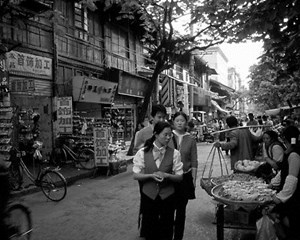After I interviewed my family, I stayed in China for a month to travel around by myself for the first time. I'd gone sightseeing in the past – to the Three Gorges, to Yellow Mountain, Mount Emei, Jiuzhaigou, Xi'an – but always with family who had planned everything, bought the tickets and figured out the routes. As an adult, I had travelled alone in several foreign countries in which I'd felt confident figuring things out independently, but I still felt a sense of unease in China, like a child who doesn't know how to take the train by herself – and this was the feeling I wanted to overcome.
在采訪完家人之后我又在中國呆了一個(gè)月,開啟了我的第一次獨(dú)自旅行。以前我也在中國旅行過——去過三峽、黃山、峨眉山、九寨溝、西安——不過這些旅行都是和家人一起去的,和家人一起計(jì)劃好一切,買好票,定好路線。作為一個(gè)成年人,我曾獨(dú)自在幾個(gè)國家旅行過,在那些地方我對(duì)獨(dú)立解決問題很有信心,然而在中國我有不安的感覺,就像一個(gè)孩子不知道該如何獨(dú)自坐火車,這是我想要克服的感覺。
I welcomed in the new year with a friend in Nanjing. Alone, I travelled through Hangzhou and Suzhou. These days, the logistical hurdles for a tourist visiting China are complex and ever-changing. For one, everyone uses Alipay. If you have Alipay, the whole world of modern China is spread out at your feet: train tickets, taxis, bike shares, late-night food delivery. But it's very difficult to register for Alipay as a mere tourist, and it's getting harder and harder to use cash. I had to get around this difficulty by using my mother's smartphone, which is linked to her Alipay account. Because it was her identity, with her name listed, and not mine, I couldn't use the account to buy train tickets, which have names printed. At the station, I had to line up at a separate window to get my paper tickets, instead of just scanning a code with my phone. I was acutely aware of how outside the system I was.
我和一個(gè)朋友在南京一起迎接新年。我獨(dú)自一人游歷了杭州和蘇州。如今來中國旅行后勤障礙非常復(fù)雜,而且一直在變。首先大家都在使用支付寶。如果你有支付寶,現(xiàn)代中國的整個(gè)世界就在你的腳下:火車票、出租車、共享單車、深夜送餐。但是,僅以游客身份注冊(cè)支付寶非常困難,使用現(xiàn)金也越來越難。為了解決這個(gè)問題,我只能用我媽媽的智能手機(jī),因?yàn)閶寢尩闹悄苁謾C(jī)綁定了她的支付寶賬戶。然而因?yàn)樯厦媸撬纳矸葑C信息,寫著她的名字而不是我的,所以我不能用媽媽的支付寶賬戶買印有名字的火車票。我只能在車站的獨(dú)立窗口排隊(duì)買紙質(zhì)火車票,而不是用手機(jī)掃碼。我敏銳地意識(shí)到自己脫離體制已經(jīng)脫離得很遙遠(yuǎn)了。

Once, a friend asked me: "How good are you at passing?" – that is, passing as Chinese-Chinese, not Chinese American. I wanted to pass, but like the many Asian Americans who, like me, have tried to go back to the motherland and find a place there, I could never "pass" for long.
有一次一個(gè)朋友問我:“你來中國容易嗎?”——也就是說,要把自己當(dāng)成華人而不是華裔美國人。我想進(jìn)來,然而有很多像我一樣的亞裔美國人想要回到祖國,在那里找到歸屬之地,而我“進(jìn)來”的時(shí)間永遠(yuǎn)不會(huì)很長。
The China I know the best is my grandparents' China. It's an old China, with rusty bicycles and motorcycle fumes, sweaty street vendors and dusty convenience stores where, as children, we took ice-cream from the coolers. Trains were slow, and everything could be haggled over. While travelling around by myself as an adult in the new China, I couldn't escape the feeling that much of what I was experiencing was a novelty. I paid for groceries via QR code. In Hangzhou, I ordered by pointing at the food other people were eating. I was reminded that, despite my family connection, China was a separate world to me, and I was a tourist like so many other expats in the country.
我最了解的中國是爺爺奶奶的中國,那是一個(gè)古老的中國,有生銹的自行車和摩托車尾氣,有汗流浹背的街頭小販和塵土飛揚(yáng)的便利店,小的時(shí)候我們會(huì)從便利店的冷藏箱里拿雪糕吃。火車很慢,什么都可以講價(jià)。作為一個(gè)成年人,在新中國獨(dú)自旅行時(shí)我無法逃避一種感覺,我感覺自己所經(jīng)歷的很多事情都是很新奇。我要通過二維碼付款;在杭州我要用手指著別人吃的食物點(diǎn)餐。這提醒著我盡管我和中國的家人有聯(lián)系,但中國對(duì)我來說是一個(gè)獨(dú)立的世界,我和許多在中國的外國人一樣只是一名游客。












